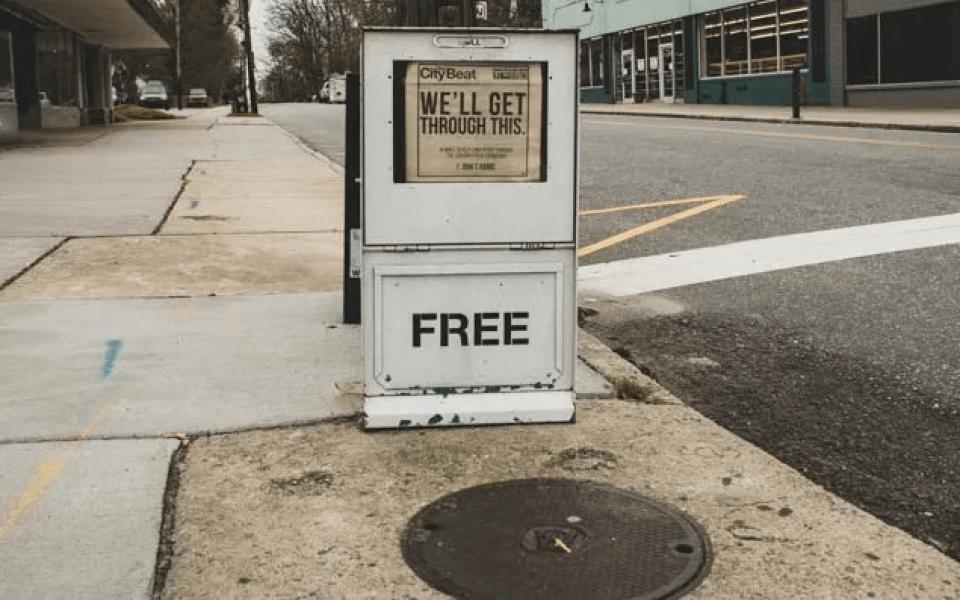Featured photo: A Triad City Beat newspaper box off of Walker Avenue in Greensboro taken by Carolyn de Berry during the COVID-19 pandemic. (photo by Carolyn de Berry)
When I first started working at Triad City Beat back in late 2014, I had no idea what journalism was or what it entailed. I could never have anticipated the heartbreaks, the joys, the never-ending river of stories that come from the job.
I was a freshly graduated college kid looking for the next thing to do when I found an ad for editorial interns at this new paper. I thought, why not?, and gave it a go. At the time, I had no idea that applying for the position and working at TCB would change my life forever.
For the next five months, I learned the many ins and outs of the trade. How to source a story, how to write a lede, a kicker, a scene. I learned how to make public records requests and the difference between a city council and a county commission. I learned about word count, deadlines, quick turns. I learned the difference between a feature, a news and an opinion piece. I learned that this is what I want to do forever.
Since returning to TCB in 2018, I’ve seen the many iterations that the paper has gone through. As a scrappy, small newsroom, Triad City Beat has always taken on the identity of the people who have worked here. In the beginning, when it was mostly Brian, Eric and Jordan running the joint, the pages were filled with long cover stories about the cities, Eric’s columns about local food and drink and Jordan’s investigations into right-wing extremists. When I started taking over the editorial side a few years back, we began shifting deeper into the racial component of the cities, which all came to a head in 2020 with the pandemic and the reckoning wrought by George Floyd’s murder. In the years since, we’ve doubled down on our civics reporting with stories that chronicle the ins and outs of city government in a way that has been lost in many of our other local publications.
What I mean to say is that things have changed.
In the last 11 years, Triad City Beat has shifted, evolved, warped, even, to fit the needs of the community and reflect back the things that have been going on here. And that’s what made this paper great.
The willingness and flexibility that it had to always put the communities it covered first above all else.
So this may feel like a sad thing that’s happening. An ending. A death.
But actually, if you really think about it, we’re not losing the core of this paper — its stories.
And that’s because the stories weren’t created by us. Sure, we found them, pitched them, transcribed them, wrote them, edited them and published them. But the stories were never about us. They were about you. We were simply the vessel.
A paper doesn’t exist without things to cover, the people and places that make a community.
And that’s why no matter what, the things that made Triad City Beat what it is will continue, because you will continue.
Often, when I tell people that I’m a journalist, people respond with, “Wow, that must be tough.”
And sure, it is. But more than anything it is the thing that gives me hope.
In the years I have dedicated to working here, I have seen the most amazing and inspiring things.
Mothers coming together to demand justice for their kids. Women cleaning each other’s homes for free. People volunteering to teach yoga to refugees. Artists creating for the greater good. Workers advocating for better treatment for themselves and their peers. Communities fighting for access to healthcare. Neighbors protecting their neighbors.
It is impossible for me to stay despondent, discouraged or disengaged while doing this work. Instead, it is a salve.
Every story, every interview uncovers an aspect of humanity — which I still believe is good. And I have you to thank for that.
So even if Triad City Beat doesn’t exist to tell these stories, the work of journalism can, and is, being done by all of us. It happens when you tell someone about a new coffee shop that you love. It happens when you volunteer for a new organization, when you connect someone with resources, when you tell your friend about a beautiful moment you experienced during your day. Because journalism, at its core, is about storytelling.
And stories are everywhere, all around us, always.
We just have to take the time to look and listen.
Join the First Amendment Society, a membership that goes directly to funding TCB‘s newsroom.
We believe that reporting can save the world.
The TCB First Amendment Society recognizes the vital role of a free, unfettered press with a bundling of local experiences designed to build community, and unique engagements with our newsroom that will help you understand, and shape, local journalism’s critical role in uplifting the people in our cities.
All revenue goes directly into the newsroom as reporters’ salaries and freelance commissions.


Leave a Reply